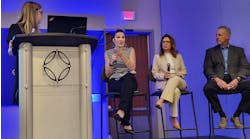Portland, OR— City Commissioner Dan Saltzman today announced the final approval of a Portland Green Building standard by the U S Green Building Council (USGBC). It is the first local version of the USGBC’s Leadership in Energy and Environmental Design. (LEED) rating system approved by the USGBC. Portland LEED, as the local system will be called, tailors the national standard to local building and development requirements while maintaining third party verification and official certification by the USGBC. "Portland LEED will make the process easier for local developers and project managers seeking LEED status," said Saltzman. "With Portland LEED, local projects can now use many of our local and state requirements as the basis for achieving green building performance which should streamline the design and documentation phases necessary to become certified as a LEED building. We are extremely pleased with the result of the City’s partnership with the USGBC." The Portland metropolitan area leads the country in implementing green building approaches. To date, two local projects have been LEED certified by USGBC, Viridian Place in Lake Oswego (Certified level) and Ecotrust Jean Vollum Natural Capital Center (Gold level). These two buildings are among only seven that are certified under version 2.0 of LEED nationally. Twenty-five other projects are registered for future certification in the Portland metro area—more than any other urban center in North America. Nationally, 407 projects are registered with LEED. "Portland clearly is a ‘Green Epi-center’ for the green building industry," stated USGBC’s President & CEO Christine Ervin. "The City’s leadership in creating this LEED adaptation benefits everyone in the region—developers, building occupants, firms wishing to locate in a responsive community, and taxpayers." City Government will be contributing significantly to the local accumulation of official green buildings in future facilities. Both the City and the Portland Development Commission adopted green building policies introduced by Commissioner Saltzman in 2001 that require facilities built or financed by the City meet or exceed the Portland LEED Certified level. New community centers, firehouses, or PDC commercial development projects will now be built to the Portland LEED standard. As key stakeholders in Portland LEED, City staff from the Portland Development Commission and the Bureaus of General Services, Environmental Services, Transportation, Parks and Planning collaborated on identifying and developing the local elements to be added to the local standard. "Portland LEED is a real step forward," said Ron Bergman, Director of the City of Portland Bureau of General Services, the City agency in charge of facility development. "It’s responsive to our local conditions and requirements, yet retains third party certification. It will definitely help clarify expectations as we plan and develop new building projects for the City." LEED and the USGBC LEED is a third party certification system designed for rating new and existing commercial, institutional, and high-rise residential buildings. The use of LEED helps to establish minimum performance levels, create a common design and construction framework, and facilitate measurement of sustainable building performance across all jurisdictions using the system. LEED also encourages top-level performance through increasingly rigorous requirements for LEED Certifed, Silver, Gold, and Platinum levels of achievement. USGBC formed in 1993 to accelerate the adoption of green building practices, technologies, policies, and standards. It launched the popular LEED system in 1999 to help stimulate green building market transformation. USGBC membership consists of nearly 2000 organizations including product manufacturers, environmental non-profit organizations, building and design professionals, building owners, and local and state governments. Besides administering the LEED program, USGBC provides technical rulings, training, networking and marketing to members. The City of Portland joined the USGBC in 1999. Local Elements in Portland LEED Three principle local construction requirements are included in Portland LEED—the City of Portland’s Stormwater Management Manual, its Erosion Control Manual and the State of Oregon’s Energy Code. The national LEED standard addresses these construction and design issues but in some cases LEED sets thresholds that fall below Portland’s local codes. Bringing these code requirements into the LEED structure now allows developers to gain green building credit for meeting and exceeding local standards. Portland LEED will also serve to help identify and provide incentives for green building strategies that are regionally significant. These incentives are embedded in Portland LEED as innovation credits that are awarded for implementing particular green building approaches that are consistent with Portland area land use and transportation goals. The approved innovation credits for Portland LEED provide additional incentives for local developers to create mixed use developments, reduce automobile use, manage stormwater on site and increase the amount of construction and demolition materials that is recycled. The complete Portland LEED supplement guidance document is available online at the Portland Office of Sustainable Development website at www.green-rated.org. LEED version 2.0 is available at the USGBC site at www.usgbc.org
Voice your opinion!
Voice your opinion!
To join the conversation, and become an exclusive member of Buildings, create an account today!
Sponsored Recommendations
Sponsored Recommendations
Latest from Industry News
Latest from Industry News
Sponsored
Sponsored

